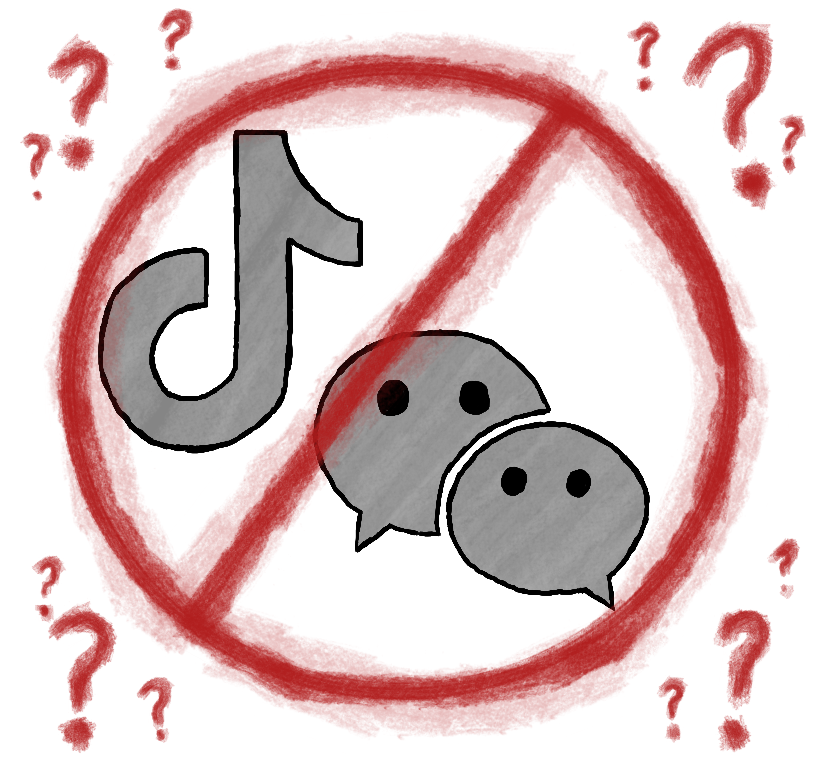The TikTok and WeChat Ban
Updates on the apps and their controversies.
Ah, yes. TikTok. It’s arguably the most popular social media app right now, where you mostly see teenagers flail their arms and dance hopelessly for views. The platform combines YouTube and Vine, enabling creators to make 15-60 second videos on whatever topic they choose. WeChat is basically WhatsApp, Google Pay, and Facebook, combined into one. Its biggest user base is in China, where people use it as a payment service or a chat service.
On August 7th, 2020, President Trump issued an executive order banning TikTok and WeChat from the United States. The Chinese companies that own them, ByteDance (TikTok) and Tencent (WeChat), had a choice to either shut down the apps or to sell them to American companies. The ban was instituted based on the assumption that the user data collected by both apps would be sent to and used by the Chinese government. For both, the ban included halting app downloads in the U.S, shutting down any American branches of the apps, and/or limiting their actions. For WeChat specifically, it meant stopping the transfer of money between users in the U.S and other countries.
TikTok’s practical applications are limited, but for WeChat, many Chinese-Americans will be disappointed when the app that allows communication with relatives living in China is banned.
The Trump administration gave the companies 45 days to sell the apps to American companies, or both would be unavailable to download in the U.S. Over this period, ByteDance had been talking with American companies like Microsoft and Oracle to reach a deal. Microsoft pulled out, leaving Oracle and Walmart as potential buyers.
If there wasn’t a deal by September 15th, the apps would be removed from app stores in the U.S. five days later. Users would still be able to use the apps if they were already downloaded on their phones, but would be unable to receive updates. This resulted in an increase in downloads for both apps.
You would think that the apps would be “dead” after the 20th, right? It turns out a group of WeChat users filed a lawsuit against the Trump administration in late August, and the group appeared in a hearing on September 17th. The judge that handled the case granted a “preliminary injunction” which, in English, is a temporary stop to Trump’s ban on the apps. The basis for the injunction was the ban’s violation of the First Amendment, and the lack of evidence that confirms U.S users were giving their data to China. The plaintiffs, the WeChat user group, noted that the app is used by elderly Chinese people living in America who don’t speak English as a way to communicate. With Oracle and Walmart close to snagging a deal with TikTok, the Commerce Department moved the deadline to September 27th, giving the apps an extra week to live.
Luck was on the apps’ side. On the 27th, a US district judge issued another preliminary injunction, saying that although the national security threats from China are real, there’s no sign of threat in TikTok or WeChat with the evidence and claims provided. An agreement is still being made between Oracle (a tech firm that Trump trusted), Walmart, and TikTok. What we know so far is that they plan to make a new company called TikTok Global, which will take over the US operations of the app. The judge also stated that if a deal cannot be reached between TikTok and American companies, the ban will be approved.
On October 30th, a U.S District Court judge in Philadelphia gave the apps yet another preliminary injunction, this time saying that it would affect the 100 million users of TikTok in the US. The date of the ban was supposed to take effect on November 12th, but something unexpected happened on that day: The Trump administration put a hold on it, saying that they have “pending further legal developments in multiple lawsuits,” according to the Wall Street Journal. With the election and the recent surge in COVID-19 cases in the U.S, did this issue suddenly become unimportant to them? Probably yes.
As of November 17th, 2020, the apps are still up and running. Who knows when this ban will be enacted. Maybe Biden’s administration will reverse it. Until then, people can keep on ruining songs by dancing, or at least continue communicating with family members.





